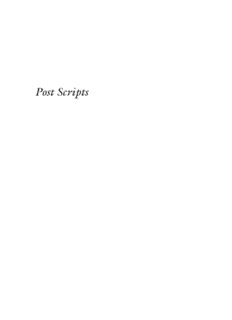Table Of ContentPost Scripts
Vincent Kaufmann
Post Scripts
the writer's workshop
Translated by Deborah Treisman
Harvard University Press
Cambridge, Massachusetts, and London, England 1994
Copyright © 1994 by the President and Fellows
of Harvard College
All rights reserved
Printed in the United States of America
Originally published as L'équivoque épistolaire, © 1990
by Les Editions de Minuit
This book is printed on acid-free paper, and its binding
materials have been chosen for strength and durability.
Library of Congress Cataloging-in-Publication Data
Kaufmann, Vincent, 1955-
[L'équivoque épistolaire. French]
Post scripts : the writer's workshop / Vincent Kaufmann;
translated by Deborah Treisman.
p. cm.
Translation of: L'équivoque épistolaire.
Includes bibliographical references and index.
ISBN 0-674-69330-2
1. French letters—History and criticism. 2. Authors,
French—Correspondence—History and criticism.
3. French prose literature—History and criticism.
4. German prose literature—History and criticism.
5. German letters—History and criticism. 6. Letter-
writing, German—History. 7. Letter-writing, French—
History. 8. Psychoanalysis and literature. 9. Modernism
(Literature). I. Title.
PQ611.K3814 1994
846.009—dc20 93-34066
CIP
Designed by Gwen Frankfeldt
Contents
Introduction: Reading in Bed 1
1 Destination: Distance 15
2 What Words Lack 55
3 Images, Memories, Mourning 107
4 The Letter, the Book 147
Notes 187
Index 195
Post Scripts
Introduction
Reading in Bed
"How do you read?" a psychoanalyst once asked me, after a talk I gave
on Rilke's correspondence. The question showed methodological
concern, but was well-meant, conspiratorial, and was intended to
make me admit what my reading method owed to psychoanalysis.
Without thinking, I short-circuited the theoretical debate my com-
panion wanted by answering that I always read "lying down." He
seemed, like me, rather surprised by the answer but also satisfied,
more satisfied probably than if I had launched into a technical expla-
nation. I was dealing with a real psychoanalyst, I thought.
In fact through what was, when it comes down to it, a misunder-
standing, everything had somehow already been said. First because
the conversation was the result of a misunderstanding and psycho-
analysis depends fundamentally on the existence of misunder-
standings—which are just as important as understandings. And, sec-
ond, because answering "lying down" to a psychoanalyst whose
question was basically theoretical would remind him of his patients
who, lying on his couch, are not in the least concerned with method-
ology. It would suggest that reading a text from an analytical point of
view requires the reader to occupy not only the position of the ana-
lyst—from whom he borrows a certain assumed knowledge—but
also the position of the patient being analyzed, of the one who is there
to express himself in words. Valéry once said that the poem listens to
its reader. We could say more generally that reading a text in an analyt-
ical way, observing its gaps and repetitions, makes us its "analyst" but
Introduction: Reading in Bed
also puts us in a position to be analyzed or "spoken" by the text—and
for this second possibility to occur, I think, we have to read lying
down.
In order to create misunderstanding, you need a kind of reading
that is both concentrated and distracted. You must learn to avoid li-
braries, where you can't lie down; you must give your body the chance
to forget itself, which it doesn't have on a chair or at a desk. When you
read sitting, the text is opposite, drawing you into a dialogue. But to
understand or imagine the unspoken subtext of a text, you need to
avoid a face-to-face confrontation. You have to dodge its direct ap-
peals and distance yourself, so as not to answer only what it wants you
to answer. You need a capacity not for sympathy and dialogue, but for
impassivity and absence. You must always read from the position of a
third party, a dead third party perhaps—the position that Lacan as-
signs to the analyst.1 It is easiest to do this lying down because, pros-
trate, you can forget yourself and disappear. (Lying down is the most
popular position for disappearing, if not permanently, then at least
into sleep, and there are few experiences more deeply satisfying than
falling asleep while reading.)
That is about all I can say about the analytical dimension of my
reading "method," which is more a constraint than a theoretical
choice. I sometimes think that it is simply a result of my inability to
read when I am not lying down. Maybe this inability has limited my
literary interests, or prevented me from becoming the literary histo-
rian I always dreamed of being. Even more seriously, maybe my taste
for the prone position actually inspired me to write this book, which
is dedicated to the letters of a number of writers (Kafka, Flaubert,
Proust, Rilke, Baudelaire, Mallarmé, Artaud, Valéry, and Gide, in or-
der of appearance). If it is conceivable for the specialist of a particular
writer to read his or her entire correspondence sitting up—as a pri-
mary biographical document, say—it is virtually impossible to read
the complete correspondence of several writers without lying down.
There is, first of all, the boredom that this genre can provoke. How
2
Description:We assume that words are posted (mailed or, in another sense, positioned) to communicate with others, to bridge distance and "wish you were here". However, Vincent Kaufmann discovers in his chosen letter writers the urgency not to communicate, to keep their correspondents away, and, as it were, post

